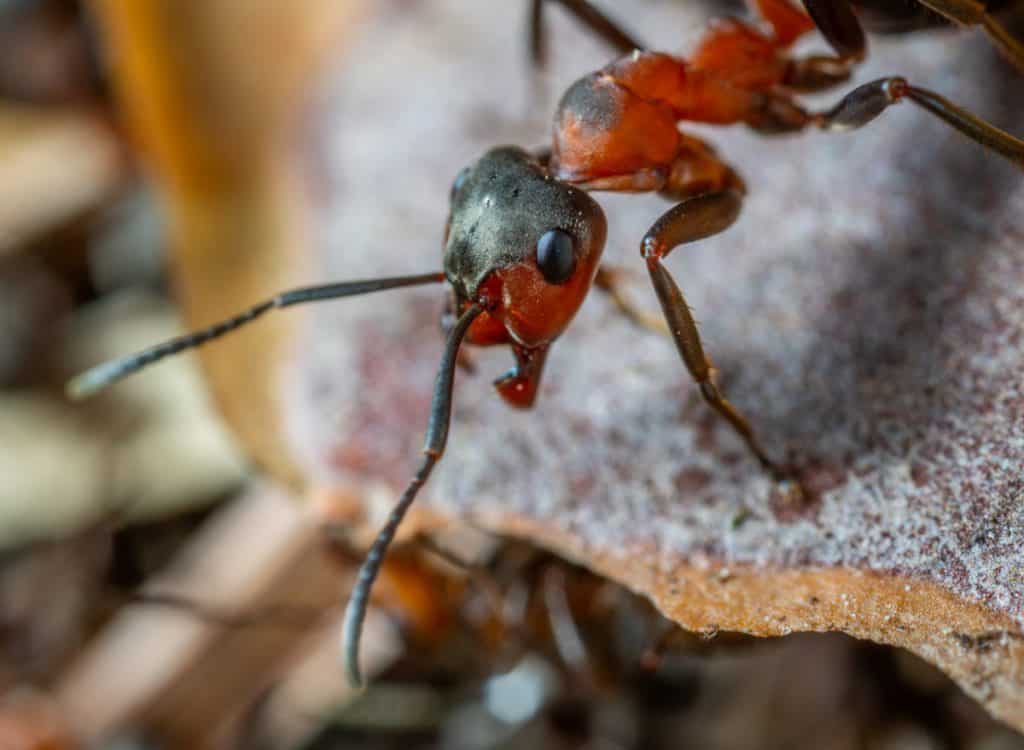
If you enjoy reading this article, why not check out our articles on Can Vinegar Really Get Rid of Ants? and Why Do Dead Ants Attract More Ants? Everything You Need to Know
What kind of ants bite humans?
If you have ever bitten by an ant, it may get a bit annoying and itchy. However, just like any animals, ants tend to bite if they feel threatened or they are protecting their home from us. There are more than 10,000 species of ants, and not all of them bite. Other species can cause significant effects such as a systemic effect on humans.
So, which ants bite humans?
Fire ants, common house ants, and carpenter ants are more likely to bite you. However, all species of ants have the ability to bite since they all have mandibles that they use for defending themselves. It really depends on how aggressive a species is when faced with danger.
In this article, you will get a list of the most common ant species that bite humans. You would also know why they bite and what triggers them to do so. Plus, some helpful tips on how to protect yourself from ant bites, as well as how to treat them using homemade remedies and over-the-counter medicines.
The Most Common Ant Species that Bite Humans
All ants indeed have the ability to bite. However, not all of them choose to bite humans or become aggressive and attack us for any reason. These common ant species are the ones you can see almost everywhere.
Knowing which ants bite and how severe their bites are will also help you in treating their bites and practice preventive measures in order to protect yourself from ant bites, especially those that can become life-threatening when they are left untreated.
Carpenter ants
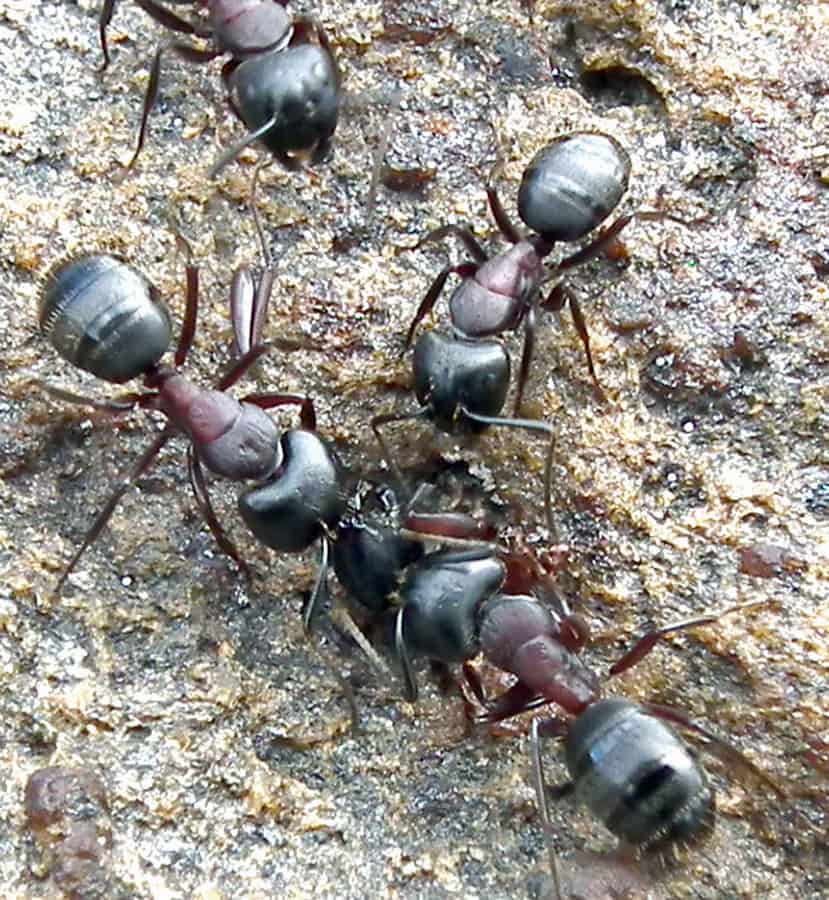
This is the most common ant species that build their nests on anything that is wood. While these ants do bite humans, their bites are not deadly. However, they can become itchy and painful because of the substance called formic acid that is sprayed in their bites and enters the bloodstream through those bites.
This will also create a raised mark that usually wears off after two to three days. Immediate medication is required when the swelling and the pain stays for more than four days as this could be an allergic reaction and must be examined by a doctor as soon as possible.
Carpenter ants can be a lot of trouble. Since they love wood so much, they are fairly likely to be in your house – especially in the winter. Read more about that here: Where Do Ants Live in Winter?
Black ants
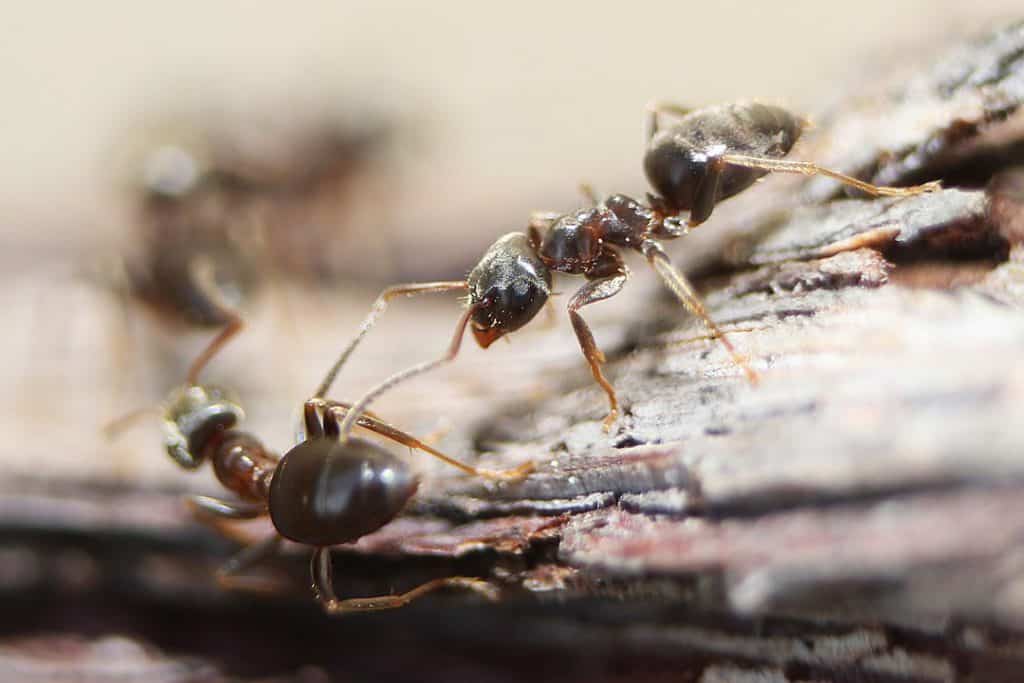
These species of ants can bite when they are scared and when they protect their nests. Most sub-species of black ants are docile and sticks to foraging in wood and plant fibers but the black imported fire ants and pavement ants have powerful bites that can compete with red ant bites.
They can leave a swelling, itchy skin because of the formic acid from their bite. Black
ant bites are not lethal but they can trigger allergic reactions to some and can become life-threatening when not attended by a medical professional right away.
Red Ants
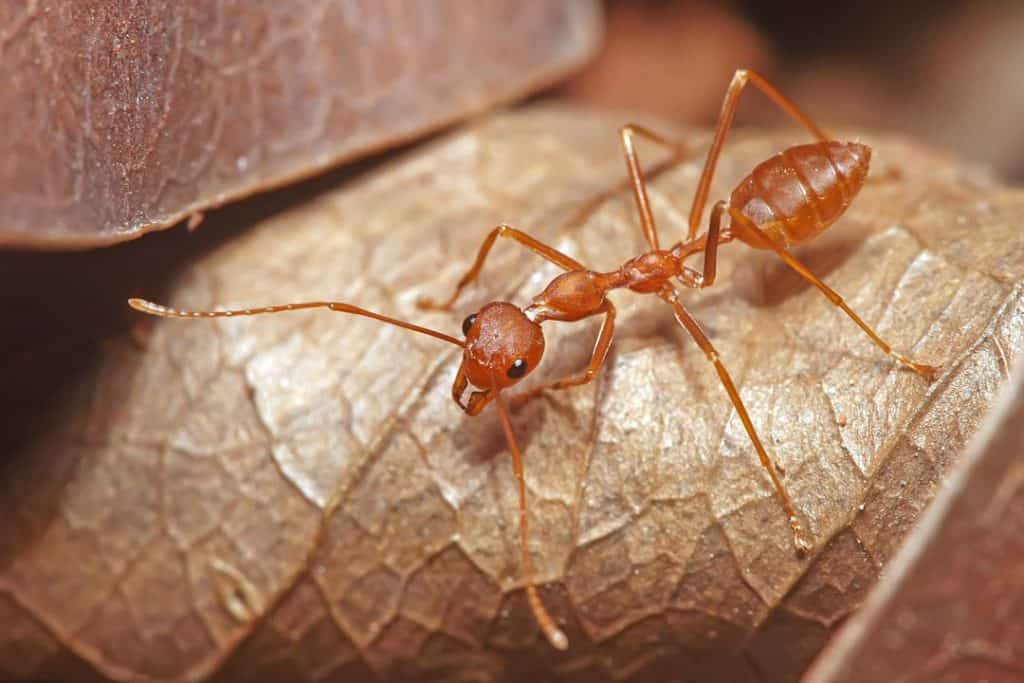
There are different types of species in the red ant category. These ants are commonly mistaken for fire ants. Carpenter ants, tawny crazy ants, and velvet ants are part of this species. They are the same color as the fire ants which is brownish red and has a few similar characteristics to each other.
Red ants are a bit more annoying and destructive rather than dangerous. For example, tawny ants usually just show up in your home or space that you don’t usually expect to find ants in. While carpenter ants, on the other hand, nests in wood which can damage any wood structures that you may have.
Flying ants
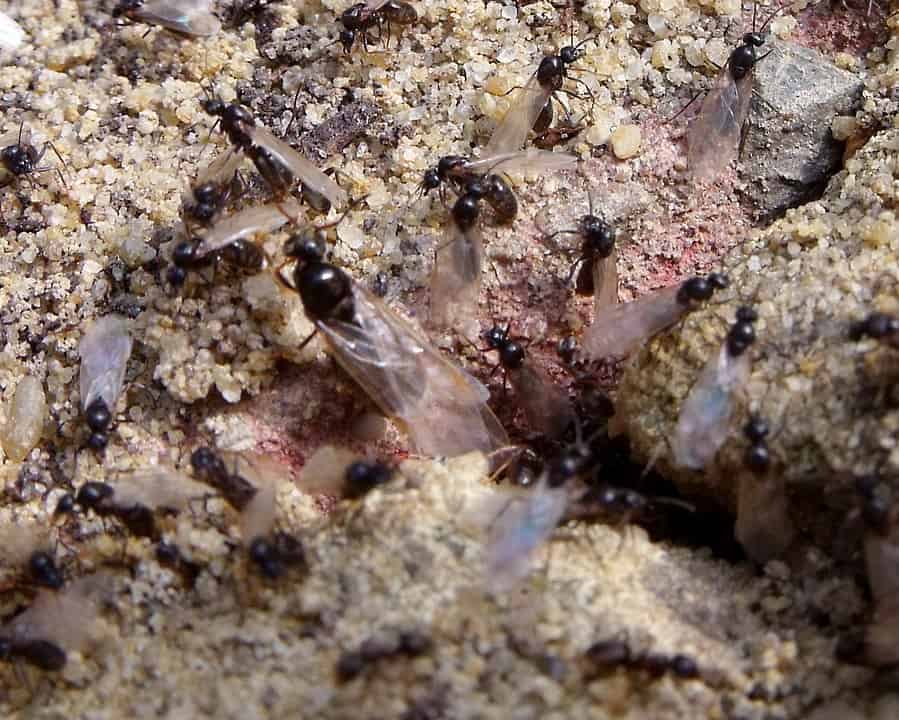
These ants, also known as “alates” to entomologists, are sexually mature ant species that developed wings. Whichever species they are from; these winged ants only have one thing in mind – to find a mate. Determining whether these flying ants bite people is done by simply looking at what type of ants they are.
While they are flying, they can be quite intimidating and can make us duck in fear. However, they are all harmless when they are on air. But don’t pick them up easily when they are on the ground because they can bite.
White ants
White ants are termites. They can cause very itchy bites when they come in contact with your skin and their mandibles are sharp enough to dig deep into it, causing burns and swelling that can last up to a week.
Now, these white ants would only bite you if hold them. These termites dine on wood and attack other insects that they may encounter along the way.
Fire Ants
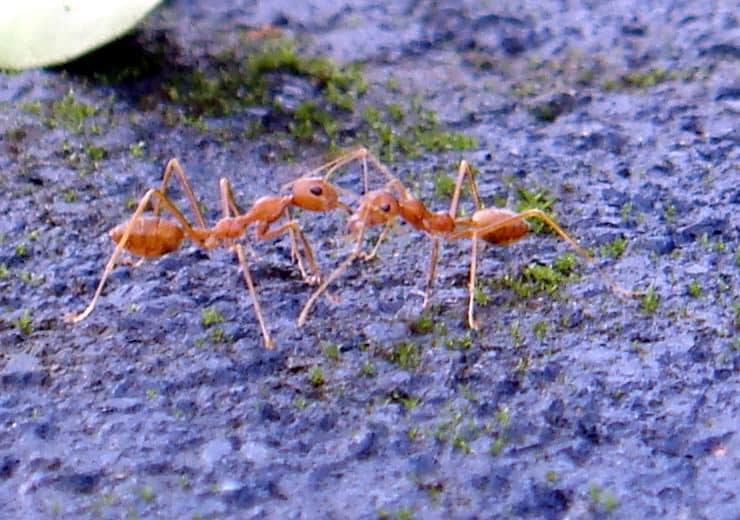
These ants are known as in its scientific name Solenopsis Invicta. They originated in South America and eventually colonized the southeast part of the US. They are usually half an inch long with a red to brown coloring.
The red ants use their venom to stun their prey, which allows a large group of red ants to overcome a much larger animal. Their bite produces only a minor sting but multiplies that to a hundred or even a thousand stings then you definitely have a problem.
You will feel an intense pinching or burning immediately after the ants bite you. However, this pain is short-lived and can only last for about a few seconds. Once the pain has passed this is where the itchiness comes in.
The itching may be mild to intense depending on the skin that it had contact with. However, most stings heal on their own once the days pass by.
Fire ants can be vicious! If they’re around your house you should watch out for your pets as well. Find out more by reading Can Fire Ants Kill Your Pets?
Argentine Ants
Argentine ants are originally from Argentina and Brazil. Now, these ants only bite when they feel threatened or provoked. The bites that they give are not severe at all. They do not have stingers, unlike other species of ants.
The biggest health risk that argentine ants may cause is food contamination. They usually crawl over garbage, dead animals, and sewage looking for food. Having said this, it can bring germs into your home. They can bring germs into your home that can cause diseases like dysentery.
Why Do These Ant Species Bite Humans?
Ant bites are not dangerous but they do have negative effects and risks on a person. There are also other ant species that can cause an allergic reaction, pain, and itching. There are also some cases where a bite can be life-threatening.
The main reason why ants bite is because it is their way to defend themselves. Ants are omnivorous and a lot of them are predatory. However, humans are not something that they prey on.
If you get bitten or stung by an ant, this means that you are a threat to them or their colony. Some colonies are not visible to humans which makes it common for people to sit next to it.
In this situation, the ants will usually have the opportunity to bite you.
Preventive Measures You Can Follow to Avoid Ant Bites
There are a lot of things that you can do to prevent yourself from being bitten by ants.
- One thing that you can do is wear protective clothing, such as thick socks and boots if you feel that you are going to be in a place where ants may dwell.
- You should also avoid working in or around fire ant mounds. Using insect repellants is designed to repel any ants or insects that may come your way. You may purchase this in the market or even in online stores.
- If in any case that you have been bitten already or found an ant on your body, it is best to get out of the area as soon as possible.
- People should not stomp on the ant mounds even if you are wearing protective clothing.
- If you attack a mound, this would prevent the ants to attack you. It is also best to check if the ants are in your home since they tend to move inside for protection from any weather conditions.
Now, if you notice that there are a lot of ants inside your home, it is best to contact the nearest pest management company in your area.
How to Treat Those Painful Ant Bites
There are a lot of home remedies that you can do if you experience any painful bite from these ants. However, if you experience trouble breathing, dizziness, swelling of the tongue, and loss of consciousness, it is best to contact your nearest physician.
Some of these remedies are very helpful to get rid of itchiness, pain, or a burning feeling on the ant bite.
- The first thing you can do is to apply a cold compress in order to reduce the swelling. You should do this within 20 minutes on and off.
- Another thing that you can do is apply hydrocortisone cream to the affected area. This can relieve the itching of the skin.
- The third thing that you can do is to take an oatmeal bath which is also a great factor in helping relieve the pain and itchiness.
- If you feel that you are experiencing an allergic reaction, applying a triple antibiotic ointment will help prevent infections.
- Taking an antihistamine to manage a minor allergic reaction will help prevent severe reactions.
- It is best to prevent yourself from scratching. If you scratch too much it can open the blisters and may cause infection.
Again, do not take chances if you feel that the allergic reaction is getting worse. It is best to go to the nearest physician so that you can have epinephrine administered.
Conclusion
At most times, the ant’s bites and stings because they feel threatened or if you are within their colony. Their bite can have a different reaction to different people. Some people are allergic to their stings and bites. Some of the ant species that bite humans are fire ants, common house ants, and carpenter ants. These are just some of the ants that can cause severe reactions, however, all species of ants have the ability to bite. Knowing the right ant to avoid is important, you don’t want to have that annoying and itchy feeling on your skin when they bite you!
If you enjoyed reading this article, why not check out our articles on Where Do Ants Hide? Let’s Find Out and What Can Ants Eat? Let’s Find Out
Recent Posts
Tiny Black Bugs in Bathroom NO WINGS: What They Are and What to Do!
Finding tiny black bugs in your bathroom can be uncomfortable, to say the least. Especially if they are persistent, or they appear in very large numbers, which they often like to do. When it...
Tiny Black Bugs in Plant Soil - What Are They & What To Do About It
A short horror story: You get a new houseplant. You do your best to take care of it. You’ve ensured that it has the right soil, the right amount of sun, it gets enough water. And then one day, you...

